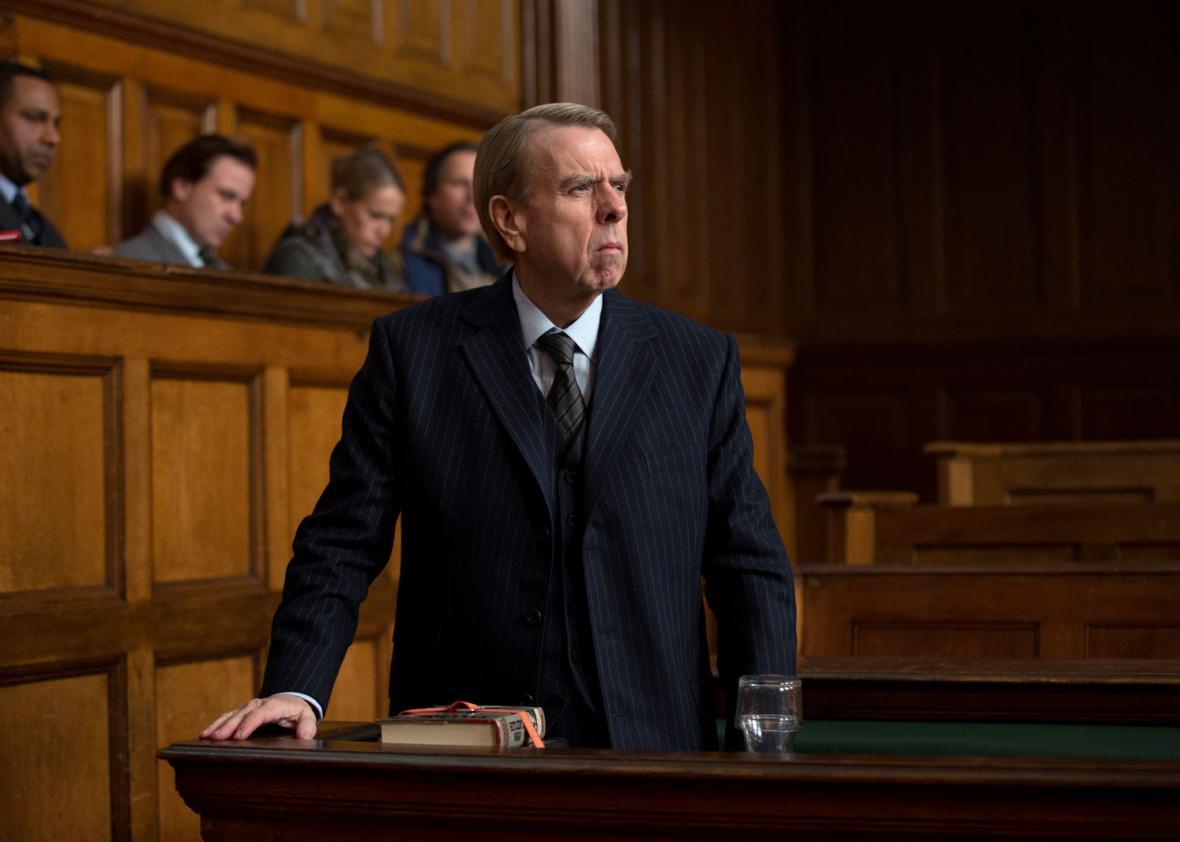When introducing Denial at its Toronto International Film Festival premiere, director Mick Jackson made a point of connecting David Irving (Timothy Spall), his film’s Holocaust-denying antagonist, to a certain American presidential candidate. Irving was a “liar, a racist, and a demagogue,” Jackson explained, before knowingly asking his audience, “Does that sound familiar?” And in an interview with Time last week, the film’s star Rachel Weisz indicated that the script intentionally drew such parallels: “I think screenwriter David Hare was inspired by Donald Trump—this idea that you can just have an opinion one day and an opinion the next day and speak as if it’s a fact.” Indeed, over the past month, critics have responded to Denial by framing both positive and negative reviews around the idea of the film as a sobering Trump allegory.
In September 1996, David Irving—a prolific author and once-respected World War II historian—sued professor Deborah Lipstadt for libel, alleging that her book Denying the Holocaust misstated that he distorted facts and evidence in order to legitimate Holocaust denial. Denial, which opened last week, is based on this true story, and centers on the ensuing legal battle. The film builds up to the trial by tracking Lipstadt (Weisz) and her team’s meticulous defense strategy. It covers ground that should be familiar to observers of this year’s election—sexism in Irving’s casually dismissive treatment of Lipstadt, demagoguery in his pseudo-logical arguments that fan flames of racism and anti-Semitism—with an overriding focus on an extremist ideology being pushed into the mainstream. The contemporary resonance—whether deliberate or not—is undeniably potent. But Denial shouldn’t be mistaken for a measured, cautionary tale about Trumpism. For those dismayed by the Trump phenomenon, the film plays more like wish fulfillment.
Holocaust denial has been prevalent since the immediate post-war period, but Irving’s celebrity emerged at the apex of a resurgence in the 1990s. His high profile was due as much to the increasingly hateful sentiment he dredged up in his followers as it was to his oratory skill as an anti-Semitic demagogue, which indeed feels familiar. But in Denial, Irving basically embodies an entire extremist movement. He is its face, the source of its information, the vessel for its message. And while focusing on Irving’s “denial” instead of showing the complicated circumstances around him makes for a powerful dramatic choice, it renders the movie exceedingly simple, eschewing realism and ignoring the broader context of Irving’s rise in the process.
Through Spall’s excellent portrayal, Irving—who is so hubristic that he chooses to represent himself in court—is fashioned as a delicious villain to be scrupulously taken down, scene by scene. Lipstadt’s team gradually perfects the same strategy that has been the Clinton campaign mission for months: use his own words against him. And it works—or at least it does in Denial. Lipstadt feuds with her attorneys over whether Holocaust survivors should testify on her behalf—she believes their stories are essential; her team views them as potential distractions—but before long, she’s basking in the mastery of Barrister Richard Rampton (Tom Wilkinson) as he repeatedly backs Irving into corners and systematically pokes at his inconsistencies. There’s a perverse pleasure in watching Irving get utterly decimated by his own, contrarian arguments. When viewing the scene through a contemporary lens—and given how closely Denial aligns with the present, it’s hard not to—the prospect of Trump on a witness stand, chewed out for five uninterrupted minutes, is too intoxicating to ignore. But Irving’s comeuppance is pure theater. It’s a political fantasy that appeals to our basest instincts: reducing widespread hate to a bogeyman, and reaching for the popcorn as we watch the good guys take him down.
Whenever Irving maintains his composure or—dare I say—outwits his opponents in Denial, Lipstadt becomes obsessed with how “the press” will react. “No holes, no Holocaust,” she says, quoting Irving’s specious argument about the lack of evidence on gas chambers. “He wanted a catchy phrase, he’s got it.” And she’s right, in the sense that the media does tend to focus disproportionately on whoever has the momentum rather than who has the facts. But by neglecting to show the systemic problems around Irving in favor of portraying him as a cartoonish villain, while also implying that silencing victims can be a necessary means to a justified end, the movie is blinkered in its own way. After all, no matter how deeply Denial contends with the poisons of Holocaust denial, its antagonist is a person, not an idea—and a person is far easier to defeat.
The consequences of these simplistic choices come to a head in the movie’s climax. After Irving roundly loses the case, dubbed a deliberate liar by the judge, he goes on television to explain away his loss. As Lipstadt watches in her living room, she’s in awe of his rambling, egotistical defense—one so outside reality and so predictably bigoted that she needs her case’s solicitor, Anthony Julius (Andrew Scott), to reassure her of its nonsense. He plainly tells her to “turn him off,” as if Irving’s a joke not to worry about any longer. As if that’s the end of it.
Irving’s defense is almost identical to how some have imagined Trump attempting to delegitimize his own loss. And as Josh Voorhees has argued for Slate, such a reaction from Trump could threaten to undermine democracy as we know it. Trump’s movement wouldn’t end with his loss—just as neo-Nazism, anti-Semitism, and this particular stripe of racism didn’t end with the legal defeat of David Irving, not to mention other prominent Holocaust deniers. (A few may have even gone Trump’s way.) But instead of nuance—instead of really contending with this reality—Denial opts to give its audience the victory they’ve been desperately waiting for. In the movie’s closing minutes, Lipstadt ends her conversation with Julius, switches off the TV, and smiles in satisfaction. Truth won, bigotry lost—and for the movie’s 110-minute running-time, it can be just that simple.
